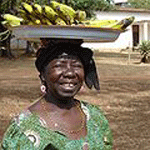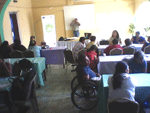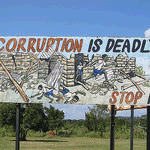Social Watch news
Published on Thu, 2013-02-14 19:54
Costa Rica has an outward image of sustainable country, committed to the environment; but the inner reality is very different. The tension between conservation and productive activities cause increasing social unrest because of land use. As an example of (un) fulfillment of the Millennium Development Goals we address the case of agroindustrial production of pineapple, which has been besieging communities and protected areas, and displacing traditional crops of nourishing importance. The technological package of agrochemicals used systematically is causing great concern, as it causes contamination of water sources. |
|
Source: . Published on Tue, 2013-02-12 16:17
» |
| Source: . Published on Fri, 2013-02-08 23:00 |
Published on Thu, 2013-02-07 19:56
In some areas of its foreign policy, Switzerland does not earn the best marks for its contribution to the Millennium Development Goals. Its finance and trade policy is driven by self-interest and contributes to restricting the policy space of poor countries. Although Switzerland has substantially increased its development budget and pursues good pro-poor development cooperation by international comparison. As a donor country Switzerland is bound primarily by the eighth Millennium Development Goal (MDG). This means that it should support the poorest countries in realising development goals 1 to 7 and adapt its trade policy and that of its financial centre to the needs of the poorest countries. Its endeavours towards a coherent, pro-development policy have also remained rather modest. |
Published on Thu, 2013-02-07 19:28
The national MDG targets in Cameroon are far from becoming a reality by 2015. It is recommended to concentrate efforts on transparency in the management of public resources, on improving the quality of the education system, strengthening the Expanded Programme of Immunization and reducing childhood diseases, and the implementation of sustainable development programs, in particular through legislation on land and environmental management standards in the growth strategy. |
Published on Thu, 2013-02-07 18:54
The achievement of the MDGs in Nicaragua is in imminent danger due to the serious difficulties faced by virtue of several factors, such as low economic growth, increasing population demanding food and work, and growing corruption. Although there has been progress in some of them, this is not enough and does not approach the goal. |
| Source: . Published on Mon, 2013-02-04 14:03 |
|
Published on Fri, 2013-02-01 23:00
Advocates for social justice require tools and measures to track country performance and promote accountability and policy change. The UCLA World Policy Analysis Center (WORLD) has collected data on laws and policies in 193 countries relevant to the priority objectives of Social Watch and member groups, including gender equity, the eradication of poverty, and factors that shape poverty, such as labor conditions and educational policies. Our findings related to policies affecting children have been translated into user-friendly maps, which are available on our public website (http://childrenschances.org). This data allows advocates to see how their country compares to others in implementing legislation and policies aimed at reducing poverty and guaranteeing gender equity. It also provides the tools to hold countries accountable to their international commitments. |
Published on Wed, 2013-01-30 11:59
The government of Uganda has continuously allocated resources to reach the Millennium Development Goals (MDGs), but its failures in fighting corruption slow down progress, says David Obot, researcher for the Development Network of Indigenous Voluntary Associations (DENIVA) and main author of the Ugandan civil society contribution to the Social Watch Report 2013. Uganda may reach three of the eight MDGs by 2015. The other goals would be missed, particularly those related to sectors where corruption is highly concentrated. |
Published on Wed, 2013-01-30 10:08
The crisis of the Congolese economy was due to the fall in copper prices and the oil shock of 1974, followed by the "Zairisation" of the country, and it was reinforced by bad governance and high population growth, which sends every year to the labor market a lot of people of working age. This crisis was exacerbated by the sack of 1991 and 1993 and the liberation wars of 1996 and 1998. There is great poverty in the country and we do not find the least political will in terms of job creation. |
SUSCRIBE TO OUR NEWSLETTER











